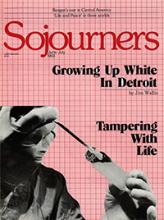I met Karl Gaspar in January. We were both in Geneva for the dialogue between First and Third World theologians which I wrote about in this column a few months ago.
Conferences, I must admit, are not my favorite things. The best part about them, and often the redeeming aspect, is the people you meet. And sometimes, if you are fortunate, a new friendship is made which makes the whole trip worthwhile.
During that week in January, Karl Gaspar and I became friends. The sense of kindred spirit and common struggles came easily and quickly. We are the same age. Both of us have come out of the student movements of the 1960s, he in the Philippines, and now root our activism in a deeply held Christian commitment. We each do theology for the sake of building a grassroots movement in the churches, and both work closely with small "base communities" emerging throughout the church in our two countries.
During the busy conference schedule we found time to take long walks and talk about the gospel and what it means for us. We spoke of our backgrounds, families, theological work, political struggles, and personal lives.
The sometimes academic and overly rhetorical nature of the conference bothered us both. I laughed and then almost cried when Karl carried out his assignment to report from our small group to the plenary session by improvising a drama and dance to convey what we had discussed. His spontaneity and creativity were infectious as Karl brought genuine feeling and joy to the often dry proceedings of the conference.
Read the Full Article

